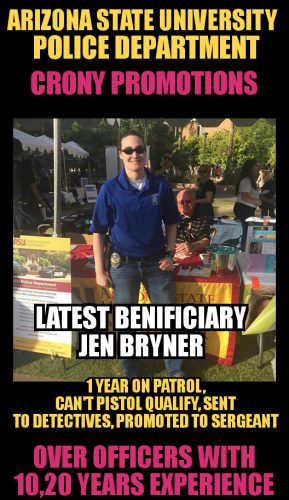Q: What kind of expertise and professionalism can victims within the Arizona State University community expect from their police department detectives?
A: Rookie expertise & less professionalism than a fraternity during pledge week.
That’s right folks, virtual world training for detectives on computers at ASU Police Department is a reality VERSUS real world training as a police detective through handling criminal cases, interviewing actual victims, suspects, and mentoring with experienced detectives.
If you are investigative reporters and looking for a story, look no further than one of the most important aspects of a police department besides patrol, detectives, the branch that is supposed to follow up on unsolved crimes and close cases.
-
What is the case closure rate of ASUPD Detectives? How is that statistic generated?
-
What kinds of cases are ASUPD Detectives closing?
-
What is the ASUPD Detective record on closing drug trafficking cases?
-
What is the ASUPD Detective record on closing sexual assault cases?
-
What is the ASUPD Detective record on closing property crime cases?
-
Do ASUPD Detectives focus on property crimes over crimes against people?
-
Of the types of cases sent to ASUPD Detectives, how many are left pending indefinitely?
-
Of the types of cases sent to ASUPD Detectives, how many have been “SAT ON” and the officers handling them, at the supervisor level, made the decision whether or not to forward them to prosecution based on their belief in the likeliness of a conviction?
-
Of the types of cases sent to ASUPD Detectives, how many actually get sent to the Maricopa County Attorney for prosecution?
-
Are ASUPD Detectives being directed to do immoral practices and procedures in order to influence crime statistics that portray the Arizona State University in an unrealistically favorable manner?
Since this article came out, nearly everyone in the ASUPD Detectives scattered to the wind and have been replaced? Why?
-
Why have ASUPD Detectives had 4 Supervisor changes in less than four years?
-
What kind of training have ASUPD Detectives received to handle the 1000’s of cases sent to them over the last 10 years? If ASUPD doesn’t pay for detectives to be properly trained, mentored, before being on the job, then where is the money going? More importantly, what type of job are they doing for the Arizona State University community?
-
How come the ASUPD Special Victims Unit was formed to combat the sexual assault crisis at America’s largest college, but former police detectives who came to ASUPD with a wealth of experience were shunned in favor of the same political cronyism appointees we were so used to under the years of John Pickens as chief?
-
One of these political cronies, Jennifer Bryner, had 1 year on patrol, couldn’t qualify with her pistol, was moved into detectives immediately afterwards, and then was promoted to Sergeant, again over officers with 10-20 years experience after camping out in detectives for a short period.

ASU Police Department adds Special Victims Unit
Under the new management of Chief Michael Thompson, the ASU Police Department has seen many recent changes including the creation of two new roles within the force for Special Victims detectives.
Sgt. James Short, overseer of the Special Victims Unit, wrote in an email that detectives assigned to the Special Victims Unit will investigate cases involving physical and sexual abuse, domestic violence and crimes against children.
Sexual misconduct also includes sexual harassment, which is constituted by sexual behavior that creates an environment of intimidation, hostility or offense.
Short said the detectives will be working closely with other agencies such as the Maricopa County Attorney’s Office, the ASU Office of Equity and Inclusion, the ASU Office of Student Rights and Responsibilities, Family Advocacy Center Services and the university’s Title IX Coordinator.
Short said Special Victims detectives will investigate all cases in their jurisdiction, which includes the four ASU campuses, regardless of whether students are involved.
Crimes involving sexual and domestic abuse are of an inherently sensitive nature. While ASU seeks to educate its students about these crimes and encourages all victims to report acts of sexual violence, that is not always what happens, Short said.
“It is the responsibility of anyone having knowledge of sexual misconduct to report the information, but ultimately it is the victim’s choice to pursue one or more of these reporting options,” he said. “It is…the victim’s choice as to how the case will be conducted. If the victim chooses not to take police action, the university has other resources…who can assist in an administrative investigation based on the circumstances and the victim’s discretion.”
Short said ASUPD will also direct victims to support services and on-campus clubs if they wish to utilize them, and a complete list of support services and education programs are available online.
Director of ASU Wellness Karen Moses wrote in an email, “The increase in awareness seems to have had a positive impact, as the percentage of female students who reported having experienced attempted and/or completed sexual assault decreased from 4.7 percent to 3.1 percent from 2014 to 2015.”
Moses said she is hopeful that a specialized unit for Special Victims will encourage more victims to report crimes.
Although sexual assault cases are frequent on college campuses, spokesperson Nicole Franks wrote in an email that there has been a general decrease in sexual assault cases across ASU campuses and that crime statistics can be located in the Annual Clery Report.
Statistics aside, Franks said “focusing two of our detectives on these types of crimes is an effective use of personnel and expertise.”
Adding the Special Victims Unit was just one of the many changes that have happened at ASUPD.
Since Chief Michael Thompson took over, ASUPD has hired more personnel, including two new officers this summer and 15 in the past year. The department began training the force in diversity and cultural awareness, as well as implemented the LiveSafe app.
Franks said the app and its various features have proven successful so far, although there are only 3,336 LifeSafe users, with 1,091 using the SafeWalk feature and 10 using the SafeRide feature, which was launched on July 11 to allow students to request Safety Escort services.
There was also a LiveSafe scavenger hunt from August 11 to August 23 designed to raise awareness for the app.
“We are always looking for smarter policing approaches,” Franks said.
Related Links:
We the Police: The relationship between Tempe and its protectors
ASU Police Department battles with uncertain effects of budget cuts
Curious about how your daughter’s potential future sexual assault will be handled? Look at this.
Look at the record from actual Arizona State University students victimized 1st by a criminal, 2nd by how the ASUPD mishandled their cases, and 3rd by how they were victimized again by the ASU Administration. The Arizona State University, like too many colleges in the US, has a disgusting RAPE CULTURE. The university response has been to run a useless publicity campaign.
https://sundevilsagainstsexualassault.wordpress.com/


